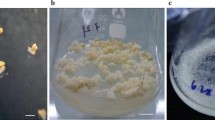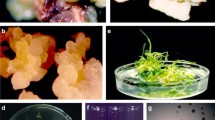Abstract
Induced mutagenesis offers a useful method to improve desirable characters in sugarcane (Saccharum spp. hybrids). In this study, eleven Ethyl Methyl Sulfonate (EMS)-induced mutants of the Indian sugarcane cultivar CoC 671 were evaluated for smut disease resistance along with agronomic and quality traits viz. early maturity, high sucrose, high cane yield and for quality. PCR-based early detection assay for smut resistance was successfully adopted using the Internal Transcribed Spacer sequence of Sporisorium scitamineum and the same was correlated with field-grown mutants exhibiting resistance upon artificial smut pathogen inoculation. The smut resistant mutants were also found superior for juice and sugar quality parameters such as Brix %, Sucrose %, Purity % as well as Commercial Cane Sugar content at 10th and 12th month maturity. Mutants TC 2819 and TC 2826 exhibited superior for sucrose content (20–24%) than parent CoC 671 (18–21%), respectively, at 10th and 12th month of maturity. The study highlights potential of EMS-induced genetic variability for the mutants with smut resistance and agronomic traits in sugarcane.


Similar content being viewed by others
References
Bakshi, R., T.V. Sreenivasan, B.K. Sahil, and N. Singh. 2001. Introgression of low temperature tolerance and red rot resistance from Erianthus in sugarcane. Euphytica 122: 145–153.
Butterfield, M.K., A. D’Hont, and N. Berding. 2001. The sugarcane genome: A synthesis of current understanding, and lessons for breeding and biotechnology. Proceedings of South African Sugarcane Technologist Association 75: 1–5.
Creste, S., D.M. Sansoli, A.C.S. Tardiani, N.D. Silva, F.K. Gonçalves, T.M. Favero, C.N.F. Medeiros, C.S. Festucci, L.A. Carlini-Garcia, M.G.A. Landell, and L.R. Pinto. 2010. Comparison of AFLP, TRAP and SSRs in the estimation of genetic relationships in sugarcane. Sugar Tech 12: 150–154.
Dalvi, S.G., P.G. Gudhate, and D. Teerthaprasad. 2011. Low cost support matrix for potato micropropagation. Potato Journal 38(1): 47–50.
Dalvi, S.G., V.C. Vasekar, A.B. Yadav, G.B. Dixit, D. Theerthaprasad, and R.B. Deshmukh. 2012. Screening of promising sugarcane somaclones for agronomic traits, and smut resistance using PCR amplification of inter transcribed region (ITS) of Sporisorium scitamineum. Sugar Tech 14: 68–75.
Doule, R.B., P.G. Kawar, R.M. Devarumath, and Y.S. Nerkar. 2008. Field performance and RAPD analysis for assessment of genetic variation in sugarcane somaclones. Indian Journal of Genetics 68(3): 301–306.
Doyle, J.J., and J.L. Doyle. 1990. A rapid total DNA preparation procedure for fresh plant tissue. Focus 12: 13–15.
Greene, E.A., C.A. Codomo, N.E. Taylor, J.G. Henikoff, and B.J. Till. 2003. Spectrum of chemically induced mutations from a large-scale reverse genetic screen in Arabidopsis. Genetics 164: 731–740.
Hemaprabha, G., R. Nagarajan, and S. Alarmelu. 2004. Response of sugarcane genotypes to water deficit stress. Sugar Tech 6: 165–168.
Hemaprabha, G., R. Nagarajan, S. Alarmelu, and U.S. Natarajan. 2006. Parental potential of sugarcane clones for drought resistance breeding. Sugar Tech 8: 59–62.
Hotta, C.T., C.G. Lembke, D.S. Domingues, E.A. Ochoa, G.M.Q. Cruz, P.D.M. Melotto, T.G. Marconi, M.O. Santos, M. Mollinari, G.R.A. Margarido, A.C. Crivellari, W.D. Santos, A.A. Hoshino, H. Carrer, A.P. Souza, A.A.F. Garcia, M.S. Buckeridge, M. Menossi, M.A. Van Sluys, and G.M. Souza. 2010. The biotechnology road map for sugarcane improvement. Tropical Plant Biology 3: 75–87.
Iskandar, H.M., R.E. Casu, A.T. Fletcher, S. Schmidt, J. Xu, D.J. Maclean, J.M. Manners, and G.D. Bonnett. 2011. Identification of drought-response genes and a study of their expression during sucrose accumulation and water deficit in sugarcane culms. BMC Plant Biology 11: 1–14.
Jain, S.M. 2001. Tissue culture-derived variation in crop improvement. Euphytica 118: 153–166.
Jain, S.M., D.S. Brar, and B.S. Ahloowalia (eds.). 1998. Somaclonal variation and induced mutations in crop improvement, 421–446. Dordrecht: Kluwer Academic Publishers.
Jalaja, N.C., T.V. Sreenivasan, S.M. Pawar, P.G. Bhoi, and R.M. Garker. 2006. Co 94012: A new sugarcane variety through somaclonal variation. Sugar Tech 8: 132–136.
Jankowicz-Cieslak, J., and B.J. Till. 2016. Chemical mutagenesis ofseed and vegetatively propagated plants using EMS. Current Protocols in Plant Biology 1: 617–635.
Jayakumar, V., Ramesh Sundar, A. & Viswanathan, R. Biological Suppression of Sugarcane Smut with Endophytic Bacteria. Sugar Tech 21, 653–660 (2019). https://doi.org/10.1007/s12355-018-0684-1
Lakshmanan, P., R.J. Geijskes, K.S. Aitken, C.P.L. Grof, G.D. Bonnett, and G.R. Smith. 2005. Sugarcane biotechnology: The challenges and opportunities. Vitro Cell Developmetal Biology-Plant 41: 345–363.
Majid, M.A., K.M. Shamsuzzaman, M.A.R. Howlider, and M.M. Islam. 2001. Development of sugarcane mutants with resistance to red rot, water logging and delayed for non-flowering through induced mutations. International Atomic Energy Agency Technology Document 1227: 31–44.
Ming, R., Liu, S.C., Moore, P.H., Irvine, J.E., Paterson, A.H., 2001. QTL analysis in a complex autopolyploid, genetic control of sugar content in sugarcane. Genome Research 11, 2075–2084
Ming, R., S.C. Liu, J.E. Bower, P.H. Moore, J.E. Irvine, and A.H. Paterson. 2002a. Construction of Saccharum consensus genetic map from two interspecific crosses. Crop Science 42: 570–583.
Ming, R., Y.W. Wang, X. Draye, P.H. Moore, J.E. Irvine, and A.H. Paterson. 2002b. Molecular dissection of complex traits in autopolyploids: Mapping QTLs affecting sugar yield and related traits in sugarcane. Therotical Applied Genetics 105: 332–345.
Moosawi-Jorf, A.S., and M.B. Izadi. 2007. In-vitro detection of yeast like and mycelium colonies of Ustilago scitaminea in tissue cultured plantlets of sugarcane using polymerase chain reaction. Journal of Applied Science 7: 3768–3773.
Murashige, T., and F. Skoog. 1962. A revised medium for rapid growth and bioassays with tobacco tissue culture. Physiologia Plantarum 15: 473–497.
Nikam, A.A., R.M. Devarumath, M.G. Shitole, V.S. Ghole, P.N. Tawar, and P. Suprasanna. 2014. Gamma radiation, in vitro selection for salt (NaCl) tolerance and characterization of mutants in sugarcane (Saccharum officinarum L.). Vitro Cell Developmental Biology-Plant 50: 766–776.
Oloriz, M.I., V.G. Gil, L. Rojas, N. Veitía, M. Hofte, and E. Jimenez. 2011. Selection and characterization of sugarcane mutants with improved resistance to brown rust obtained by induced mutation. Crop and Pasture Science 62: 1037–1044.
Oloriz, MI, Gil, V, Luis R., Veitia, N., Hofte, M. And Jiménez E. 2012. Selection and characterisation of sugarcane mutants with improved resistance to brown rust obtained by induced mutation. Crop Pasture Sci. 62:1037–1044
Panse, V.G., and P.V. Sukhatme. 1967. Statistical methods for agricultural workers, 2nd ed. New Delhi: ICAR.
Papini-Terzi, F.S., F.R. Rocha, R.Z.N. Vencio, J.M. Felix, D.S. Branco, A.J. Waclawovsky, B.L. Del, C.G. Lembke, M.D.L. Costa, M. Y. Nishiyama Jr., R. Vicentini, M.G.A. Vincentz, E.C. Ulian, M. Menossi, and G.M. Souza. 2009. Sugarcane genes associated with sucrose content. BMC Genomics 10: 1–21.
Patade, V.Y., and P. Suprasanna. 2008. Radiation induced in vitro mutagenesis for sugarcane improvement. Sugar Tech 10: 14–19.
Patade, V.Y., P. Suprasanna, and V.A. Bapat. 2008. Effect of salt stress in relation to osmotic adjustment on sugarcane (Saccharum officinarum L.) callus cultures. Plant Growth Regulation 55: 169–173.
Prabhakar, K., M. SubbaRao, K.V. NagaMadhuri, K. RamaSubbaiah, and G. Karunsagar. 2012. Evaluation of promising varieties for yield and quality in alfisols. Journal of Sugarcane Research 2: 54–56.
Que, Y., L. Jian-Wei, S. Xian-Xian, X. Li-Ping, and C. Ru-Kai. 2011. Differential gene expression in sugarcane in response to challenge by fungal pathogen Ustilago scitaminea revealed by cDNA-AFLP. Journal of Biomedical Biotechnology Article ID 160934.
Que, Y., L. Xu, Q. Wu, Y. Liu, H. Ling, Y. Liu, Y. Zang, J. Guo, Y. Su, J. Chen, S. Wang, and C. Zhang. 2014. Genome sequencing of Sporisorium scitamineum provides insights into the pathogenic mechanisms of sugarcane smut. BMC Genomics 15: 1–19.
Raboin, L. M., A. Selvi, S. Nibouche, O. K. Miranda, J. Pauquet, C. Calatayud, Zapater, M. Garsmeur, H. Telismart, J. Dintinger, H. Hoarau, L. Costet, J. Carlier, and A. D’Hont, 2006. Genetic of sugarcane resistance to smut (Ustilago scitaminea): characterisation of pathogen diversity, QTL mapping in a bi-parental progeny and associations study among modern cultivars. In ‘Vth ISSCT molecular biology workshop’. Reduit, Mauritius, 3–7 April 2006. http://issct.intnet.mu/pastworkshops/molbiolabstract06.html#b.
Rutherford, R.S., S.J. Snyman, and M.P. Watt. 2014. In vitro studies on somaclonal variation and induced mutagenesis: progress and prospects in sugarcane (Saccharum spp.): A review. The Journal of Horticultural Science & Biotechnology 89(1): 1–16.
Sarsu, F., M.M. Spencer-Lopes, R. Sangwan, and S. Penna. 2018. In vitro methods in plant mutation breeding. In Manual on mutation breeding, 3rd ed, ed. M.M. Spencer-Lopes, B.P. Forster, and L. Jankuloski, 205–226. Rome: Food and Agriculture Organization of the United Nations.
Shanti, R.M., S. Alarmelu, and R. Balakrishnan. 2005. Role of female parent in inheritance of brix in early selection stage of sugarcane. Sugar Tech 7: 39–43.
Singh, N., and B.M. Somani. 2005. In vitro screening of sugarcane to evaluate smut susceptibility. Plant Cell Tissue Organ Culture 80: 259–266.
Singh, N., B.M. Somani, and D. Pillay. 2004. Smut disease assessment by PCR and Microscopy in inoculated tissue cultured sugarcane cultivars. Plant Science 167: 987–994.
Sreenivasan, T.V., and N.C. Jalaja. 1998. Induced mutations and somaclonal variation in sugarcane. In Somaclonal variations and induced mutations in crop improvement, ed. S.M. Jain, D.S. Brar, and B.S. Ahloowaliya, 442–446. Dordrecht: Kluwer Academic Publishers.
Sugarcane Breeding Institute. 2011. Vision document 2030. Coimbatore: Sugarcane Breeding Institute.
Suprasanna, P., S.M. Jain, S.J. Ochatt, V.M. Kulkarni, and S. Predieri. 2010. Applications of in vitro techniques in mutation breeding of vegetatively propagated crops. Chapter 28. In Plant mutation breeding and biotechnology, ed. Q.-Y. Shu, B.P. Forster, and H. Nakagawa, 369–383. Vienna: FAO-IAEA and CABI.
Suprasanna, P., S.J. Mirajkar, and S.G. Bhagwat. 2015. Induced mutations and crop improvement. In Plant biology and biotechnology, ed. B. Bahadur, M.V. Rajam, L. Sahijram, and K.V. Krishnamurthy, 593–618. Berlin: Springer.
Tammisola, J. 2010. Towards much more efficient biofuel crops-can sugarcane pave the way? Genetically Modified Crops 1: 181–184.
Tawar, P.N., R.A. Sawant, K.V. Sushir, R.M. Devarumath, R.S. Hapase, and N.T. Meti. 2016. VSI 434: New sugarcane variety obtained through somaclonal variation. Agriculture Research 5: 127–136.
Viswanathan, R., and G.P. Rao. 2011. Disease scenario and management of major sugarcane diseases in India. Sugar Tech 13: 336–353.
Wagih, M.E., A. Ala, and Y. Musa. 2004. Regeneration and evaluation of sugarcane somaclonal variants for drought tolerance. Sugar Tech 6: 35–40.
Acknowledgements
Authors are thankful to the Director General, Vasantdada Sugar Institute, Pune, India for providing funding and facilities for carrying out the work. Authors are also thankful to faculty of Tissue Culture Section and Plant Pathology Section of VSI, for their technical help.
Author information
Authors and Affiliations
Corresponding author
Ethics declarations
Conflict of interest
The authors declare that the research was conducted in the absence of any commercial or financial relationships that could be construed as a potential conflict of interest.
Additional information
Publisher's Note
Springer Nature remains neutral with regard to jurisdictional claims in published maps and institutional affiliations.
Rights and permissions
About this article
Cite this article
Dalvi, S.G., Tawar, P.N., Suprasanna, P. et al. EMS-Based In Vitro Mutagenesis and Mutant Screening for Smut Resistance with Agronomic Traits in Sugarcane. Sugar Tech 23, 854–864 (2021). https://doi.org/10.1007/s12355-020-00931-x
Received:
Accepted:
Published:
Issue Date:
DOI: https://doi.org/10.1007/s12355-020-00931-x




